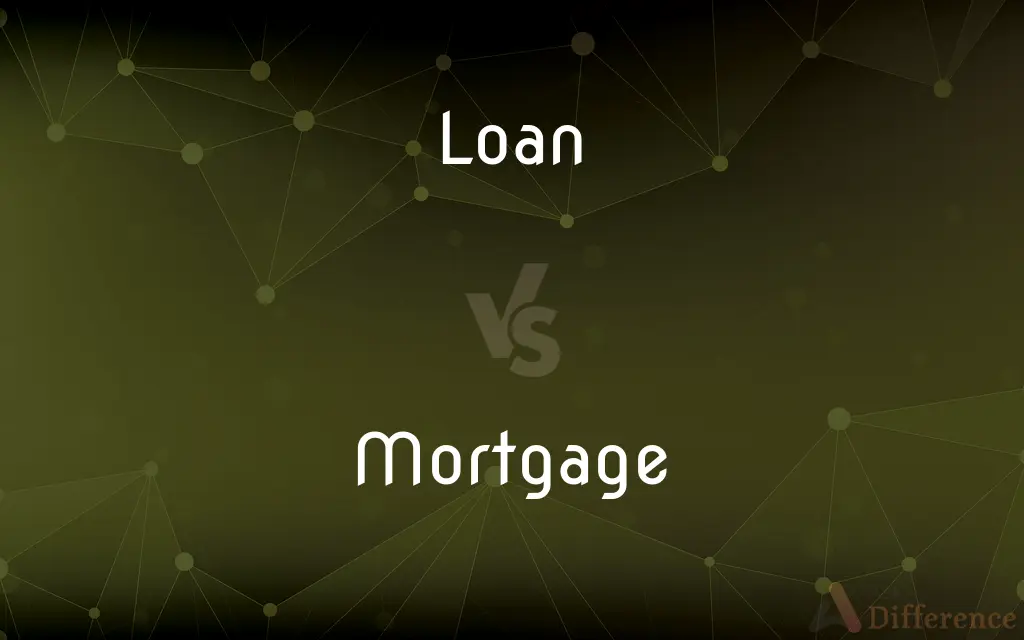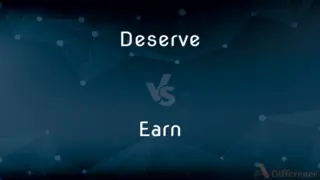Loan vs. Mortgage — What's the Difference?
By Tayyaba Rehman — Updated on September 15, 2023
A loan is a general term for borrowed money to be repaid with interest, while a mortgage is a specific type of loan secured by real estate.

Difference Between Loan and Mortgage
Table of Contents
ADVERTISEMENT
Key Differences
A loan represents a broad financial agreement wherein an entity lends money to another, expecting the borrower to return the principal amount along with some form of interest. Loans can be for various purposes – education, travel, purchase of goods, etc. – and can have varied terms based on duration, interest rate, and repayment structure. Conversely, a mortgage is a specialized form of loan explicitly tied to real estate or property.
Mortgages are unique in that they are secured loans. This means that the borrowed money is guaranteed by the value of the property being purchased. If the borrower fails to make payments on a mortgage, the lender has the right to take ownership of the property through a legal process called foreclosure. While many loans might require collateral (assets pledged if the loan isn't repaid), mortgages always involve real estate as collateral.
It's also notable that mortgages usually have longer durations than most other types of loans. While a personal or auto loan might span a few years, mortgages typically last for decades. Additionally, because mortgages involve larger amounts of money and longer durations, they often have more stringent qualification processes, requiring thorough credit checks, down payments, and documentation.
In essence, while both loans and mortgages involve borrowing money and repaying it with interest, the key difference lies in the purpose and security involved. A loan is a broad term covering various borrowing scenarios, while a mortgage is specific to real estate and comes with the added dimension of property as collateral.
Comparison Chart
Definition
Borrowed money to be repaid with interest.
Loan specifically secured by real estate.
ADVERTISEMENT
Collateral Required
Varies; not always.
Always – the real estate itself.
Typical Duration
Can range from short-term to long-term.
Usually long-term (e.g., 15 to 30 years).
Risk of Default
May lead to lawsuits or loss of collateral.
Can lead to foreclosure, loss of property.
Use
General use; varied purposes.
Specifically for purchasing or refinancing real estate.
Compare with Definitions
Loan
A transaction resulting in a debt to be settled over time.
With a low-interest loan, they renovated their home.
Mortgage
A legal agreement wherein property guarantees loan repayment.
The couple's mortgage has a fixed interest rate for 15 years.
Loan
A sum of money borrowed to be paid back with interest.
She took out a loan to pay for her college tuition.
Mortgage
A real estate-secured loan to finance property.
The mortgage on their condo will be paid off in 10 years.
Loan
An advance of funds with a promise of return.
The federal loan helped students afford higher education.
Mortgage
A long-term loan for real estate purchase.
She refinanced her mortgage to take advantage of lower rates.
Loan
Money provided temporarily on the condition of repayment.
The startup secured a significant loan to fund its operations.
Mortgage
A loan secured by the collateral of a property.
They took out a mortgage to buy their dream house.
Loan
In finance, a loan is the lending of money by one or more individuals, organizations, or other entities to other individuals, organizations etc. The recipient (i.e., the borrower) incurs a debt and is usually liable to pay interest on that debt until it is repaid as well as to repay the principal amount borrowed.
Mortgage
A legal agreement by which a bank, building society, etc. lends money at interest in exchange for taking title of the debtor's property, with the condition that the conveyance of title becomes void upon the payment of the debt
I put down a hundred thousand in cash and took out a mortgage for the rest
Loan
An instance of lending
A bank that makes loans to small businesses.
Mortgage
Convey (a property) to a creditor as security on a loan
The estate was mortgaged up to the hilt
A heavily mortgaged farm
Loan
A sum of money that is lent, usually with an interest fee
Took out a loan to buy a car.
Repaid the loan over five years.
Mortgage
A loan for the purchase of real property, secured by a lien on the property.
Loan
The agreement or contract specifying the terms and conditions of the repayment of such a sum.
Mortgage
The document specifying the terms and conditions of the repayment of such a loan.
Loan
The repayment obligation associated with such an agreement
She couldn't afford the loan after losing her job.
Mortgage
The repayment obligation associated with such a loan
A family who cannot afford their mortgage.
Loan
The right to payment associated with such an agreement
A bank that buys consumer loans.
Mortgage
The right to payment associated with such a loan
A bank that buys mortgages from originators.
Loan
The state of being lent for temporary use
A painting on loan from another museum.
Mortgage
The lien on the property associated with such a loan.
Loan
To lend (money or property).
Mortgage
To pledge (real property) as the security for a loan.
Loan
An act or instance of lending, an act or instance of granting something for temporary use.
Because of the loan that John made to me, I was able to pay my tuition for the upcoming semester.
Mortgage
To make subject to a claim or risk; pledge against a doubtful outcome
Mortgaged their political careers by taking an unpopular stand.
Loan
A sum of money or other property that a natural or legal person borrows from another with the condition that it be returned or repaid over time or at a later date (sometimes with interest).
All loans from the library, whether books or audio material, must be returned within two weeks.
He got a loan of five thousand pounds.
Mortgage
(legal) A special form of secured loan where the purpose of the loan must be specified to the lender, to purchase assets that must be fixed (not movable) property, such as a house or piece of farm land. The assets are registered as the legal property of the borrower but the lender can seize them and dispose of them if they are not satisfied with the manner in which the repayment of the loan is conducted by the borrower. Once the loan is fully repaid, the lender loses this right of seizure and the assets are then deemed to be unencumbered.
We're renting a property in the city centre because we can't afford to get a mortgage yet.
Loan
The contract and array of legal or ethical obligations surrounding a loan.
He made a payment on his loan.
Mortgage
(obsolete) State of being pledged.
Lands given in mortgage
Loan
The permission to borrow any item.
Thank you for the loan of your lawn mower.
Mortgage
To borrow against a property, to obtain a loan for another purpose by giving away the right of seizure to the lender over a fixed property such as a house or piece of land; to pledge a property in order to get a loan.
To mortgage a property, an estate, or a shop
We mortgaged our house in order to start a company.
Loan
(Scotland) A lonnen.
Mortgage
To pledge and make liable; to make subject to obligation; to achieve an immediate result by paying for it in the long term.
Loan
To lend (something) to (someone).
Mortgage
A conveyance of property, upon condition, as security for the payment of a debt or the preformance of a duty, and to become void upon payment or performance according to the stipulated terms; also, the written instrument by which the conveyance is made.
Loan
A loanin.
Mortgage
State of being pledged; as, lands given in mortgage.
Loan
The act of lending; a lending; permission to use; as, the loan of a book, money, services.
Mortgage
To grant or convey, as property, for the security of a debt, or other engagement, upon a condition that if the debt or engagement shall be discharged according to the contract, the conveyance shall be void, otherwise to become absolute, subject, however, to the right of redemption.
Loan
That which one lends or borrows, especially a sum of money lent at interest; as, he repaid the loan.
Mortgage
Hence: To pledge, either literally or figuratively; to make subject to a claim or obligation.
Mortgaging their lives to covetise.
I myself an mortgaged to thy will.
Loan
To lend; - sometimes with out.
By way of location or loaning them out.
Mortgage
A conditional conveyance of property as security for the repayment of a loan
Loan
The temporary provision of money (usually at interest)
Mortgage
Put up as security or collateral
Loan
A word borrowed from another language; e.g. `blitz' is a German word borrowed into modern English
Mortgage
Borrowing for property with the property as security.
They're struggling to make their monthly mortgage payments.
Loan
Give temporarily; let have for a limited time;
I will lend you my car
Loan me some money
Loan
A financial agreement between a lender and a borrower.
The bank approved his loan application for a new car.
Common Curiosities
What happens if I default on a mortgage?
Defaulting on a mortgage can lead to foreclosure, where the lender takes the property.
What's a fundamental distinction between a loan and a mortgage?
A loan is money borrowed for various purposes, while a mortgage is specifically for real estate.
Can all loans be called mortgages?
No, only loans secured by real estate are mortgages.
Can a mortgage be for something other than a house?
Yes, mortgages can be for any real estate, including commercial properties.
What is a loan's principal amount?
It's the initial amount borrowed, excluding interest.
Is interest always charged on a loan?
Typically, yes. Lenders charge interest as compensation for the risk and time value of money.
How is a mortgage payment typically structured?
It often includes principal repayment, interest, taxes, and insurance.
Can I prepay a loan or mortgage without penalties?
It depends on the terms. Some have prepayment penalties, while others don't.
Are mortgage rates usually higher than personal loan rates?
Not necessarily; mortgages often have lower rates because they're secured by valuable property.
What's the difference between a fixed-rate and adjustable-rate mortgage?
A fixed-rate mortgage has a constant interest rate, while an adjustable-rate can change over time.
Why would someone choose a mortgage over paying cash for a property?
Leveraging a mortgage can preserve cash flow, take advantage of tax deductions, or invest elsewhere.
Can I have multiple loans and mortgages at once?
Yes, but approval depends on factors like creditworthiness and debt-to-income ratio.
What does "refinancing a mortgage" mean?
It means replacing the current mortgage with a new one, often with better terms or rates.
Is collateral always required for a loan?
No, some loans are unsecured, but they might have higher interest rates.
Are loans only provided by banks?
No, loans can also be offered by credit unions, online lenders, and other financial institutions.
Share Your Discovery

Previous Comparison
Wine vs. Vinegar
Next Comparison
Deserve vs. EarnAuthor Spotlight
Written by
Tayyaba RehmanTayyaba Rehman is a distinguished writer, currently serving as a primary contributor to askdifference.com. As a researcher in semantics and etymology, Tayyaba's passion for the complexity of languages and their distinctions has found a perfect home on the platform. Tayyaba delves into the intricacies of language, distinguishing between commonly confused words and phrases, thereby providing clarity for readers worldwide.
















































